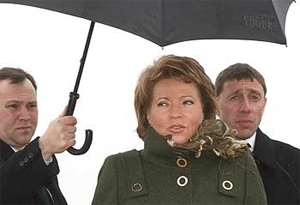04.17.2008 09:44
 St. Petersburg Governor Valentina Matviyenko said she will again propose the administrative unification of the city and the Leningrad Oblast that surrounds it in coming weeks.
St. Petersburg Governor Valentina Matviyenko said she will again propose the administrative unification of the city and the Leningrad Oblast that surrounds it in coming weeks.
Matviyenko said she would raise the matter when a new federal government is formed after the installation of Dmitry Medvedev as president in May.
“Of course, not all of my colleagues share this view but this proposal is based on an economic analysis and will allow for the development of energy policy, roads and infrastructure, as well as the effective distribution of the workforce, capital and investment,” Matviyenko told reporters at a congress of the ruling United Russia party in Moscow on Tuesday, Interfax reported.
The governor said that she is “a strong adherent” of the unification plan.
Vadim Tyulpanov, speaker of the city parliament, said he also considered the unification of the city and the Leningrad Oblast as “conditioned” by economics.
“My attitude to the idea is very positive,” Tyulpanov said on Wednesday.
Tyulpanov said that some factories located in the center of St. Petersburg which have a negative effect on the environment could be moved to the region and residential buildings built in their place.
“It is impossible now because we have different regions and different authorities,” Tyulpanov said.
Tyulpanov said such questions should be put to the public by referendum.
However, Valery Serdyukov, governor of the Leningrad Oblast, said he didn’t see economic expediency in the unification of St. Petersburg and the Leningrad Oblast.
“Nothing is hindering the economic development of the Leningrad Oblast and St. Petersburg today because it’s a market economy. The unification won’t contribute anything to the economic development of the city and the region,” Serdyukov said on Wednesday, Interfax reported.
Boris Vishnevsky, a political analyst and member of the opposition Yabloko party, said he didn’t see any sense in the merger.
“St. Petersburg and the Leningrad Oblast are two different entities with different conditions and problems,” Vishnevsky said.
“There’d be zero advantage from the merger. Instead it would need changes to the legislation that would also lead to a certain level of chaos and the expansion of bureaucratic structures,” he said.
Vishnevsky said all recent St. Petersburg governors have dreamed of uniting with the Leningrad Oblast.
“They have wanted to do so because the more territory one controls, the more profit and preference it gives, and therefore the better life one can have,” he said, hinting that those in power are corrupt and motivated by personal enrichment.
Vatanyar Yagya, a Untied Russia city parliament deputy, said he was also against unification.
“If the merger happens St. Petersburg will become a regular municipal city. It will damage the city’s image,” Yagya said.
“As for all the talk of the economic advisability of such a merger, I don’t see anything that is hindering business either in St. Petersburg or in the Leningrad Oblast now they are separate,” he said.
Maria Matskevich, senior sociologist at the Sociology Institute of the Russian Academy of Science, said that there has not been any recent public opinion research conducted on the issue. However, she said that several years ago such research showed that a significant part of the population, especially in St. Petersburg, favored the idea.
“However, it was noticeable that people didn’t have any serious background knowledge about the issue,” Matskevich said.
The idea of unifying St. Petersburg and the Lenigrad Oblast has been mooted several times in recent years, including when former St. Petersburg governor Vladimir Yakovlev called for a referendum on the matter.
However, the merger has never had the support of the Leningrad Oblast authorities.
News source: Times.spb.ru
 Print this news Print this news
City news archive for 17 April' 2008.
City news archive for April' 2008.
City news archive for 2008 year.
|